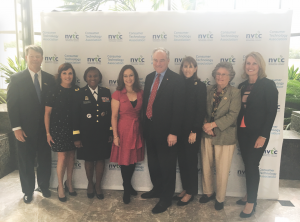By April Deocariza, Air Force Spouse
Photos by Erin J Photography
“I was always a career woman. That was my identity,” recalls T.T. Robinson, Spouse of a Navy helicopter pilot.
“When we got orders to Guam, I didn’t think I would have issues finding a job. I ended up sending out 75 resumes. It was then that I finally understood what military spouses go through. Often, as a military spouse, your job has to take the backseat. My husband just retired in May and we’ve been married for 16 years,” says Lakesha Cole, a Marine Corps spouse, entrepreneur and 2014 Armed Forces Insurance Military Spouse of the Year®. “We’ve PCSed six times and I’ve had 10 jobs. It wasn’t until the 10th job that I just decided I couldn’t keep up with reinventing myself in that capacity every time we PCSed, so I decided to create my own job and entrepreneurship proved to be the best career path.”
Stories like those of Robinson and Cole are common in the military spouse community. Somewhere between 12 and 25 percent of military spouses are unemployed, with an additional 25 percent facing underemployment, meaning they are underpaid or have skills that are underutilized compared to their training.
Cole works to connect veterans and military spouses to meaningful employment opportunities through her work with North Carolina For Military Employment and the Hiring Our Heroes Military Spouse Professional Network. Her voice, along with the advocacy and stories of other military spouses, prompted Kaine to introduce legislation aimed to help military spouses with employment issues.
DC Change Maker

Over the past year, there has been growing interest in military spouse employment because of advocates, like Democratic Sen. Tim Kaine of Virginia, who are working to make change happen on Capitol Hill.
The issue hits home for Kaine. His son is a captain in the Marine Corps and his son’s wife just started law practice in the D.C. area.
“It’s very clear that his wife’s professional path is going to be a critical decision as to whether he decides to stay in the Marines and where he decides to stay,” says Kaine. “Hearing them illuminates two things for me. First, you want to provide opportunities for military spouses because they sacrifice a lot and it’s horrible to have them sacrifice and find they are shut out of the job market. Second, it also becomes a readiness issue about getting soldiers to re-enlist if they believe their spouses can be happy in their professional lives.”
Kaine, co-chair of the Senate Military Family Caucus and a member of the Senate Armed Services Committee, introduced new legislation to help reduce military spouse unemployment. Provisions from the Military Spouse Employment Act of 2018 and Jobs and Childcare for Military Families Act of 2018 were included in the Fiscal Year 2019 National Defense Authorization Act (NDAA), signed by President Donald Trump on Aug. 13. The provisions Kaine advocated for were a result of a roundtable discussion held last year with military families where Kaine heard firsthand about the employment barriers many of them faced.
The Spark
In October 2017, Kaine joined military spouses and business leaders in Arlington, Va., for a summit on improving employment opportunities. The event was co-hosted by Blue Star Families, the Northern Virginia Technology Council (NVTC), and Consumer Technology Association (CTA).
“Military spouses are very humble, modest people and we think, ‘I don’t have a job, so this is my problem,’ but we don’t realize that the system that is set up is very difficult,” explains Kathy Roth-Douquet, CEO of Blue Star Families, regarding military spouse employment barriers. “We need to tell the story to larger society so they understand the problem exists and put our voices together to say this is a system that needs to change.”
Blue Star Families is doing its part to help military spouses secure employment. The organization recently launched its Spouseforce platform to help match military spouses to jobs and resources that fit their skills and lifestyle needs (e.g., flexible hours; telecommuting).
Since the Summit took place, NVTC has laid out new guidance for its member companies, which includes:
- Adding military spouses as a distinct group in marketing materials (not just highlighting veterans)
- Guidance for member companies to create positions that take into account military spouse challenges such as providing onsite childcare, job portability, etc.
Here is a list of military spouse provisions from Kaine’s two bills that made it in the final NDAA
- Modifies Federal Hiring Authority: Modifies federal hiring authority so that federal agencies can expedite the hiring of a candidate who is a military spouse. The most desirable jobs near military installations are often federal positions.
- Expands Small Business Opportunities for Military Spouses on Military Installations: Recognizing that spouses have faced obstacles to starting small businesses on base, this legislation encourages the Department of Defense (DoD) to submit a plan on how to best facilitate military spouse entrepreneurship on military installations.
- Instructs The DOD To Evaluate Impact of Frequent Moves on Families: The legislation instructs the DoD to evaluate the impact that frequent moves have on military families and report to Congress on its findings.
- Instructs the DOD to Expand Educational Opportunities for Military Spouses: Instructs the DoD to evaluate how to expand and advertise existing career training programs to military spouses. This includes ensuring existing installation career counselors have the most helpful information for spouses and that spouses are aware of the potentially under-utilized Military Spouse Career Advancement Account (MyCAA), which provides scholarships for spouses to pursue associate degrees, certificates, and professional licenses.
- Increases Access to Affordable Child Care for Military Families: This bill instructs the DoD to implement a program designed to increase the number of cleared childcare providers and requires the DoD to assess whether each duty station is allotted the right number of childcare subsidies for the number of families requesting them.
- Encourages DOD to Establish Dependent Care Savings Accounts: This legislation strongly encourages DoD to make flexible spending accounts available to military families so they can opt in to reserve pretax dollars from their paychecks to pay for out-of-pocket child care expenses. Uniformed service members and their families are the only group in the federal employment system who do not have this benefit.
- Provides Military Spouses With Resources to Ease Their Families’ Transition to Civilian Life: This bill allows military spouses to access Military One Source (MOS) resources for a full year, instead of just six months. MOS provides non-medical mental health counseling, career help and life coaching for veterans and military families after transitioning to civilian life.
- Increases Participation in Military Family Public-Private Partnerships: Recognizing that there are many businesses and community organizations surrounding military installations that would like to support military families, this legislation directs the DoD to make the process to enter into formal agreements with these organizations and companies clearer for installation commanders. Currently, there are numerous bureaucratic barriers to entering into public-private partnerships.
A Bipartisan Bill
When Kaine first joined the Senate in 2013, he worked to continue to bring down the veteran unemployment rate, which is now less than the national average. He hopes this new initiative will help do the same for military spouse unemployment.
“I will just credit the military spouses themselves for putting this issue on my radar screen,” says Kaine. “This bill is very bipartisan and the time between identifying the problem, identifying solutions, and getting it on the president’s desk has been fast.”
It is a game changer having an advocate in Washington who understands the challenges milspouses face and is in a position to enact change.
“I think it is such an important and worthy step in the right direction,” says Robinson, who was present during the introduction of the bill in Virginia last February. “Having a champion in military spouse employment like Sen. Kaine is an incredible thing and helps raise the conversation to the national level.”
For Cole, owner of She Swank Marketplace, helping military spouses pursue their entrepreneurial dreams is particularly meaningful:
“I had started my online business prior to PCSing to Okinawa and I thought this would be my one shot of being able to run my business full time. I wasn’t fully aware of all the regulations prior to moving there and I didn’t realize there was going to be so much red tape in operating my business,” recalls Cole, who was Kaine’s guest to the State of the Union Address early this year. “I learned the only way I could open my business was to secure a contract with the Exchange. That process took about six months.”






